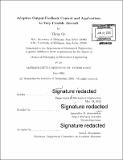| dc.contributor.advisor | Anuradha M. Annaswamy. | en_US |
| dc.contributor.author | Qu, Zheng, Ph. D. Massachusetts Institute of Technology | en_US |
| dc.contributor.other | Massachusetts Institute of Technology. Department of Mechanical Engineering. | en_US |
| dc.date.accessioned | 2016-09-13T19:14:21Z | |
| dc.date.available | 2016-09-13T19:14:21Z | |
| dc.date.copyright | 2016 | en_US |
| dc.date.issued | 2016 | en_US |
| dc.identifier.uri | http://hdl.handle.net/1721.1/104223 | |
| dc.description | Thesis: Ph. D., Massachusetts Institute of Technology, Department of Mechanical Engineering, 2016. | en_US |
| dc.description | Cataloged from PDF version of thesis. | en_US |
| dc.description | Includes bibliographical references (pages 137-141). | en_US |
| dc.description.abstract | Very Flexible Aircraft (VFA) corresponds to an aerial platform whose flight dynamics critically depends on its flexible wing shape, and has been investigated as a potential solution to generate high-altitude low-endurance flights. The dominant presence of model uncertainties and potential actuator anomalies motivate an adaptive approach for control of VFA. Another particular control challenge for VFA is that its flexible modes cannot be measured accurately, which necessitates an output-feedback multi-input multi-output (MIMO) control approach. The focus of this thesis is on an adaptive output-feedback controller for a generic class of MIMO plant models with an emphasis on the control of a VFA so as to execute desired flight maneuvers. The proposed adaptive controller includes a baseline design based on observers and parameter adaptation based on a closed-loop reference model (CRM), and is applicable for a generic class of MIMO plants of arbitrary relative degree, and therefore the overall design is suitable for control in the presence of uncertainties in flexible effects, sensor dynamics, and actuator dynamics. In addition, the proposed controller can accommodate plant models whose number of outputs exceeds number of inputs. One major advantage of the proposed design is that the number of integrators required for implementation is significantly less than that of previous methods and therefore the controller can be implemented even for large-dimensional VFA models. Conditions are delineated under which asymptotic stability and command tracking can be guaranteed, and the overall design is verified using realistic simulations on a high-fidelity VFA model with unknown varying wing shape and actuator anomalies. | en_US |
| dc.description.statementofresponsibility | by Zheng Qu. | en_US |
| dc.format.extent | 194 pages | en_US |
| dc.language.iso | eng | en_US |
| dc.publisher | Massachusetts Institute of Technology | en_US |
| dc.rights | M.I.T. theses are protected by copyright. They may be viewed from this source for any purpose, but reproduction or distribution in any format is prohibited without written permission. See provided URL for inquiries about permission. | en_US |
| dc.rights.uri | http://dspace.mit.edu/handle/1721.1/7582 | en_US |
| dc.subject | Mechanical Engineering. | en_US |
| dc.title | Adaptive output-feedback control and applications to Very Flexible Aircraft | en_US |
| dc.type | Thesis | en_US |
| dc.description.degree | Ph. D. | en_US |
| dc.contributor.department | Massachusetts Institute of Technology. Department of Mechanical Engineering | |
| dc.identifier.oclc | 958141637 | en_US |
